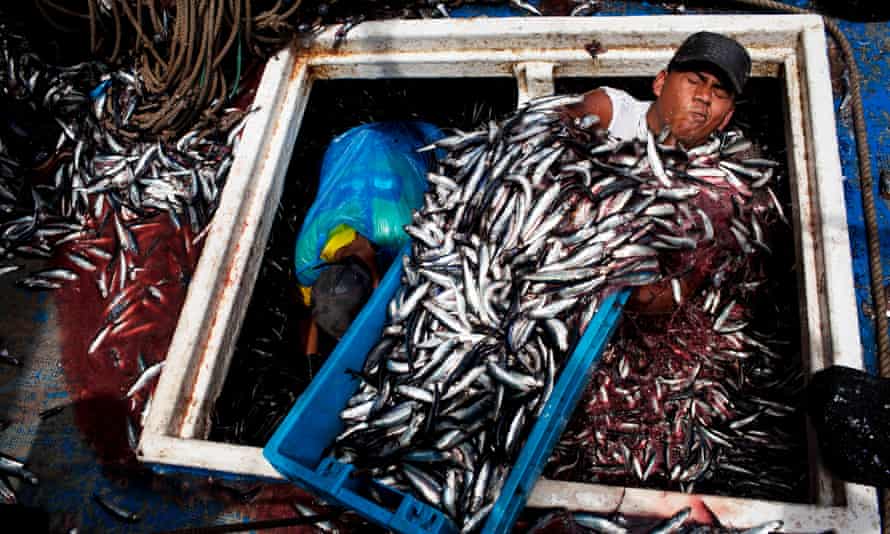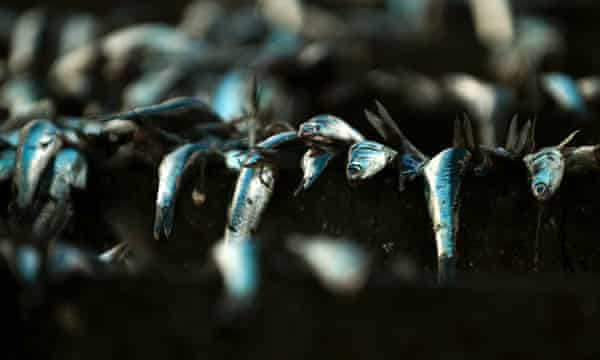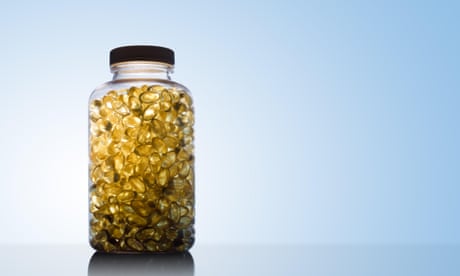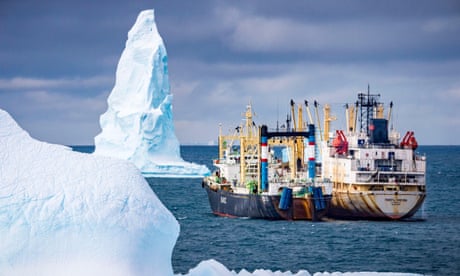‘It’s mind-boggling’: the hidden cost of our obsession with fish oil pills
The market in this prized commodity is worth billions – but are the supposed benefits worth the cost to global ecosystems?
Revealed: many common omega-3 fish oil supplements are ‘rancid’

Scanning the shelves and internet for fish oil is a dizzying task. There are dozens of brands available and, although the typical consideration for the popular supplement is that quality matters most, it is not the only factor.
These prized products travel a long way before being labelled as “pure” and “fresh” – starting with the industrial-scale grinding down of a tiny fish that is crucial for healthy ocean and food systems.
While some fish oil is made from cod, mackerel or sardines, most comes from Peruvian anchovetas, a type of anchovy. These silvery fish are an important source of nutrition for the wildlife in the Humboldt Current, one of the most productive marine ecosystems on Earth.
“I think people should know where the fish in their fish oil is coming from. It’s always good to have a face to the product they’re consuming,” says Katrina Nakamura, founder of the Sustainability Incubator, which screens labour conditions inside food supply chains.
As the world’s largest fishery, the anchoveta catch in Peru is enormous – exceeding 4m tonnes a year. Some of the haul is frozen and canned for human consumption, but it is mainly used to feed pigs, poultry and farmed fish.
Aquaculture is an expanding global industry, valued at more than £146bn in 2020, with China topping the list as the largest fish-producing country, at 58.8m tonnes a year. Aquaculture now provides half of all the seafood that humans eat – a figure expected to grow to 62% by 2030.
Now, large industry players in Peru want to scale up fish oil operations for dietary supplements, too.
Though there is still debate among scientists about the benefits of the golden-coloured supplements, there is some evidence that omega-3 fatty acids, including EPA (eicosapentaenoic acid), and DHA (docosahexaenoic acid), can aid in heart and brain function, lower the risk of cognitive function disorders, and may help to reduce inflammation.
Anchovetas are rich in EPA and DHA. According to the Global Organization for EPA and DHA Omega-3 (GOED), the industry body of omega-3 producers, an estimated 38,000 tonnes of anchovy oil are extracted for dietary supplements each year.
“It’s mind-boggling. What we can catch in a week is what many countries catch in more than one year,” says Patricia Majluf, vice-president of Oceana Peru, part of the international conservation organisation that campaigns to protect and restore the world’s oceans. “And the processing capacity of the factories is even bigger.”
Despite being highly regulated, the fishery has recently been condemned for misreporting catches, and for putting workers’ health at risk throughout the Covid-19 pandemic by failing to isolate infected crew members, leading to large outbreaks, according to a report by the Changing Markets Foundation, which in 2020 investigated harmful and unsustainable practices in Peru’s fishmeal and fish oil industry.
The fishery is also reportedly catching too many juvenile anchovetas – if the fish are caught before they reproduce, the population cannot sustain itself. Oceana has reported that some factories in southern Peru are operating illegally without appropriate permits or licences, and producing fishmeal in unsanitary conditions, while also skewing catch quotas.

Although Peru’s anchovetas are at risk of being overfished, and the fishery was on the verge of collapse in the early 1970s, the companies responsible face few sanctions. Regulations do impose temporary closures in areas where juvenile catches exceed 10%, but seven large companies in the sector flouted this rule between 2016 and 2019 and continued operating in areas already identified as having excess juvenile fish. In one case, 80 fishermen were threatened with dismissal for refusing to catch juvenile fish.
“We’re extracting millions of tonnes from an ecosystem that depends on that fish. The ecosystem is being impoverished and losing its resilience to big changes brought about by El Niños and climate change,” says Majluf.
“That fish could be used to feed our people. An industry that’s paying almost nothing for that fish is taking it all away.”
Major fish oil brands including Nature’s Bounty, Nature Made, Sundown and Kirkland tout their products as sustainably sourced from Peru; some list anchovies as an ingredient. For example, Nature’s Bounty claims: “We go to Peru because the Peruvian government has strict standards and governance on their surrounding waterways, to properly ensure the protection of the fish … all catches in Peru are carefully reviewed to meet rigorous quality checks.”

But what ends up on the shelves can still be a rotten batch: independent tests show that an alarming amount of fish oil supplements, at least 10%, are rancid. Some products reached 11 times higher than international voluntary limits for rancidity.
“It’s quite a long path that fish oils take to get to you,” says Dr Ben Albert, a fellow at the University of Auckland and a researcher into the oils’ health effects. “[Rancidity] is unlikely to be from the fish that’s caught.”
Oxidation is a normal and usually harmless process, but rancidity arises when a product is highly oxidised. In fish oil, it happens when the oil is exposed to light, air or heat – all of which tend to occur within the long and complex supply chain involved in refining the crude product.
Trade data is limited, but what is available shows that vessels can pick up a cargo of crude fish oil in Peru and ship it to China for extraction and distillation. From there, the oil moves to North America or Europe to be packaged. It’s difficult to protect the product as it moves through the production process. Time spent in the open air or in hot conditions increases the likelihood of oxidation.
“That’s part of the problem: we don’t know who these companies are exporting to. There are so many chains along the way,” says Alfonso Daniels, a researcher on the Changing Markets report.
In general, fish oil supplements are difficult to trust, says Albert. Though it should not just be left up to the consumer, his recommendation is to buy smaller amounts and store fish oils in darker, cooler places to avoid further oxidation.
None of the companies or the Peruvian authorities responded to the Guardian’s request for comment.
Alternatives such as krill or algae oil also contain unsaturated fats that allow oxidation to occur. Although both products are usually sold as a more “ecologically viable” option to overfishing critical fish populations, concerns remain: krill is often caught using harmful fishing practices, and further research is needed to develop efficient production from algae.
Meanwhile, fish oil continues to be the supplement of choice. “I think fish oil is a good product. I’m not mad at the fish oil industry for existing. But they have to respect the people in the supply chain, and they have to respect the fish and the ecosystem the fish come from,” says Nakamura.


沒有留言:
張貼留言